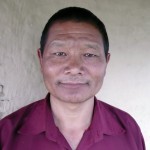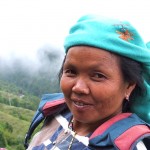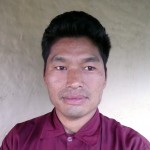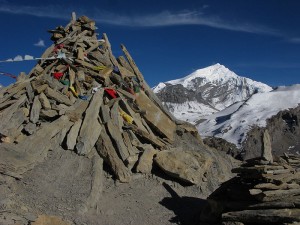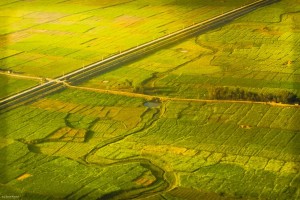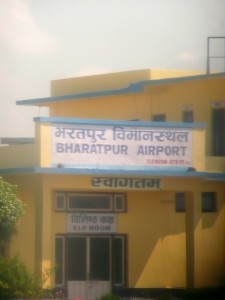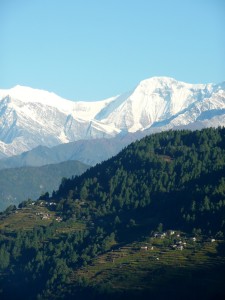Blog break until Monday October 14, 2013. Enjoy the fall!
Chapter 6 – Bigger Dreams (cont.)
Mahabir Pun began to expand the teaching pool by hiring a retired Gurkha from Nangi, called Padam, who was fluent in English. He taught English to the eighth and ninth grade classes. I met Padam when I first went to Nangi in 2002. He was my Nepali teacher. He was a kind man who was very patient with my fumbling language skills. He died a few years later from complications of alcoholism.
Mahabir was a good teacher but he was first and foremost an entrepreneur. He knew from the beginning he would not stay in Nangi because his vision for higher education had expanded to include neighboring villages, so he set about to replace himself. Using his uncanny judgement of character, he chose teachers from the school to further their education. He contacted the American Nepal Education Foundation, the very organization that gave him grant money during his school years in Kearney. He requested they finance Bachelors Degrees for five teachers from Nangi. This was a two year degree program in
Pokhara which would certify them to teach up to the 12th grade. Four out of the five teachers completed the course in 1996 and returned to Nangi. They were; Ganga, Kishan, Prem, and Hemkumarie. All the teachers can still be found walking the school aisles except Prem who died a few years after finishing. Hemkumarie, Ganga and Kishan later returned to Pokhara for their Masters Degree in their respective disciplines. Thus having secured teachers for higher education Mahabir turned his attention to helping the village develop income earning projects.
Have you ever done such a good job that you weren’t needed anymore? Shouldn’t that be the goal of any
volunteer? Share your story with my readers and join me next week to read about the first campground which ultimately birthed the present day lodge.
Chapter 6 – Bigger Dreams
Mahabir Pun returned to Nepal in September 1992 with a bachelors degree in Science Education from UNK. He had fulfilled his dream of studying abroad but during his years in Nebraska other dreams filled the void. Never one to be satisfied Mahabir began to plan for a school in Nangi that would exceed the educational standards of Nepal in the 1990s.
But first he did what most college students do after four long years of a nose to book existence. He didn’t try to find a job. He took a break. He visited his family in Chitwan and Pokhara. He joined the tourists and trekked along the Annapurna Circuit and in the Langtang area which is north of Kathmandu. Two months after his return to Nepal he found his way to Nangi to begin the arduous task of creating a high school.
By this time the Nepal government had raised the educational bar by adding the sixth and seventh grades to the Nepali curriculum. But the teachers and principle in Nangi wanted to add the eighth and ninth grades which at that time were considered high school level classes and a prerequisite for college. They had tried before but failed due to lack of money and teachers. The government paid the teachers salaries up to the seventh grade but any education beyond this was glitter on the blackboard. Unless they could provide this higher level of education most students were stuck in Nangi never to realize their potential in college because their families could not afford to send them away to school.
So Mahabir decided to stay in Nangi during the winter of 1993 and teach. He started an eighth grade with 20 students. He taught science, math and english. He helped the school apply for higher level education using his experience and degree. His dream began to unfolded and quickly snowballed into an educational avalanche of impressive proportions. His dream not only swept along the school but an entire village and ultimately an entire country.
What did you do after graduating? Travel? Work? Decompress? Move back home? Share your experiences with my readers and join me next week to see how the school in Nangi quickly became a model for other villages.
Chapter 5 – Nebraska (cont.)
Mahabir Pun majored in Science Education at UNK from Jan. 1989 to Sept. 1992. After the first semester he was more confident in his spoken English and found the work easier, relying less and less on the voice recorder to study. Carrying heavy class loads of 18 credits a semester and taking courses during the summer he was able to graduate in three and a half years. He also took some graduate level classes anticipating he wanted to return one day for his Masters in Education.
I asked him how he liked living in the flat landscape of the midwest, especially since he was raised near some of the tallest mountains in the world. He didn’t mind the flatness because it reminded him of his family in the Terai, but oddly he wasn’t fond of the hot weather which is also steamy and jungle like in the Terai…he much preferred the cold Nebraska winters.
Mahabir told me finances were not a problem because he lived simply in the dormitory, was given three meals a day at the cafeteria and had a grant for $1000 USD/year from the American Nepal Education Foundation. Knowing Mahabir he would have left the USA in the same pants and shirt as when he arrived…but packing riches which far exceeded his expectations…riches found in the friendships and ties he formed over those years at UNK.
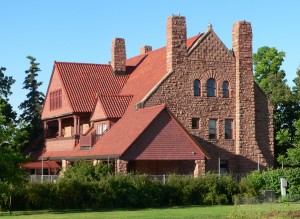
Frank House, UNK, Nebraska. Built in 1889, the house combines Richardsonian Romanesque and Shingle Style architecture. Listed in the National Register of Historic Places it now houses a museum. Photograph courtesy of WikiMedia Commons.
He was soon welcomed into Dr. Leonard Skov’s home…and heart. Leonard and Mahabir created a friendship that continues to this day…built on mutual respect and trust…key components for lasting friendships. He was also welcomed into the homes of other students, university staff and Leonard’s friends.
Have you ever found yourself in a different environment, friended by someone and given a lifetime of memories to cherish? Share your comments with my readers and join me next week as Mahabir returns to Nepal and begins to lay the foundation, both figuratively and literally, for the school in Nangi.
Chapter 5 – Nebraska (cont.)
Mahabir Pun did not spend his time in front of the TV or figuring out how to shower for very long before his first semester at University of Nebraska at Kearney went into full swing on January 9, 1989. Instead, he spent the next few years pouring over textbooks and assignments. Under Dr. Leonard Skov’s guidance he began his studies with the same fervor that the deity Manjushree (or Manjusri), a Tibetan saint, had cut the Kathmandu Valley’s Chobhar ridge in half with his mighty sword to drain the waters and expose the fertile valley. Mahabir Pun yielded his mind as a mighty sword and started the first semester with 18 credit hours of chemistry, calculus, geology, education and conversational English.
His poor skills in spoken English posed a challenge in the everyday classroom. Mahabir told me it was the main problem in the beginning…and the reason he got lost in every airport between Kathmandu and Kearney. The teachers spoke too fast and although he could read and write English he had never had the opportunity to converse except with a few tourists in Nepal. In order to compensate he started to tape all his lectures and spent hours listening to them over and over in order to complete assignments and learn the material. By the end of the fisr semester he felt comfortable talking to people in English and admits it became easier in the classroom.
He also faced another challenge posed by his Education teacher who required all assignments be typed for submission. Mahabir had never used a typewriter or computer and in 1989 there were few computers available for students on campus. He secured permission to handwrite his papers but promised to learn how to type by the end of the semester. The outcome of this challenge is a testament to his continued ability to inspire others to assist him in his quests. Mahabir told me: “One of the American students gave me his typewriter to use and I started learning to type my paper. Thus I became able to submit my final project typed in paper. The teacher was glad.”
Have you ever faced a challenge coupled by the limitations of language? Share your story with my readers. I admit to being challenged by all language, even my native tongue…thank you Associate Press Stylebook and spell check. Join me next week for more stories about Mahabir Pun’s school days in Nebraska.
Chapter 5 – Nebraska (cont.)
Mahabir Pun didn’t start his college career at the University of Nebraska at Kearney as you would expect. First, he arrived January 4, 1989 during winter break when most of the university was shut down. Second, his English speaking skills were challenged. He could
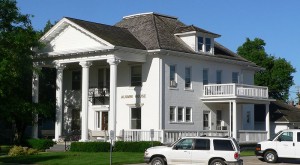
Thomas House, UNK, Nebraska. Photograph compliments of WikiMedia Commons http://commons.wikimedia.org/wiki/File:Thomas_House_(Kearney,_Nebraska)_from_NE.JPG
read and write English well but his conversational English didn’t allow for easy banter with staff or students. No, Mahabir didn’t spend those first weeks buried in books, chatting with other students and finishing his assignments…he spent it figuring out how to shower and in front of the dormitory lounge television.
“The college was closed because of the Christmas vacation. Only the Resident Director was there at the dormitory. There was cable TV in the lounge and we spent most of our time watching TV. That was the first time in my life I used the remote control of TV and I enjoyed watching different channels for many hours. However, we had problem in taking shower. For the first two days we could not take shower. We tried to take shower in the bathroom but there was no water. We turned the knob of the shower left and right many times and there was no water coming from the shower. We thought maybe there was no water just in the shower. After two days, I asked the Resident Director as when there would be water in the shower. She told that there should be water in the shower. When I told that there was no water coming, she came to the shower room and turned it on and there was water. She showed us how to turn the shower on. What we were doing was that we were just turning the knob left and right only. What we had not done was pull the shower knob. We had never used that kind of knob in Nepal.”
Have you ever traveled and been stymied by a simple task? Share your story with my readers. I recall a fellow traveler in Nepal who had never seen a pit toilet and instead of squatting over the pit he sat down with legs sticking out the door. Join me next week for more about Mahabir Pun’s early college days in Kearney.
Chapter 5 – Nebraska
Mahabir Pun and Dhananjaya’s journey to the USA was not without adventure. Imagine two young men who had never been out of their country traveling thousands of miles to a country they only knew from reading and talking to others. They traveled by way of Bangkok and Seattle, finally arriving in Denver where they were to make a connection to Kearney, Nebraska. Mahabir admitted his lack of practice with conversational English had gotten him into some precarious situations. Mahabir described some of his mis-adventures along the way and one in particular made me smile because it underscores how the differences in cultural norms between countries can cause the worst and the best of outcomes:
“In Denver airport, we could not find our luggage and tried to find it everywhere. However, we could not find it. Finally we found the airline counter and told them that we were late because we were trying to find our baggage. The airline people told that the plane had already left for Kearney and our baggage was already sent. It happened because we did not know that the airline transfers the baggage to connecting flight by themselves to the last destination and that we are not required to collect our baggage to put on the connecting flight. It was 11 pm at Denver airport and we had no idea what to do. We asked the airline people what we could do. They were so kind for us. They provided us a hotel that day and put us on next day’s flight to Kearney.”
Have you ever been in a jam and had a total stranger help you? Share your story with my readers. I recall one time when my husband and I were stranded at the Miami airport with broken ribs and an angelic American Airlines staffer secured a flight to NYC on Super Bowl weekend during a blizzard. Join me next week and read about Mahabir’s first few weeks in Kearney.
Blog Break – Food Photographs!
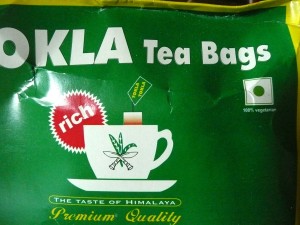
Up in the far right corner is the declaration “100% vegetarian”. And is it my imagination or do those tea leaves on the cup resemble marijuana?
When I am traveling in rural Nepal the various food choices still stun me. The variety offered on the trekking trails by local restaurants and lodges is geared to appeal to the western palate. Despite tasty temptations such as “real pizza” and Scandinavian pancakes I eat mostly dal bhat…lentils and rice. It’s the national basic food source, always freshly made, well cooked and nourishing…and I rarely get sick from those notorious intestinal hitchhikers found in developing countries.
I am often amused by the packaging…especially since many declare their product as guaranteed fresh.
 Speaking of fresh…eggs come no fresher in the village.
Speaking of fresh…eggs come no fresher in the village.
 But my all time favorite food is happy cookies! Have a cheerful day and I’ll be back next week with more about Mahabir Pun’s early days in Nebraska.
But my all time favorite food is happy cookies! Have a cheerful day and I’ll be back next week with more about Mahabir Pun’s early days in Nebraska.
Chapter 4 – 1989 (cont.)
Someone asked me, “How did Mahabir actually get to Kearney?”. So I asked Mahabir for more details and the story he told me comes as no surprise. It made me draw in my breath, laugh and sigh at the sheer incredulousness of a man driven by faith in his universe, path and fellow man.
After receiving confirmation from the college Mahabir and Dhananjaya applied for and were granted visas without difficulty. Dhananjaya received money for his trip from his family but Mahabir’s travel plans became more complicated. This story is best told in Mahabir Pun’s own words, so read on…
“but I had no money with me to get air ticket and for some other expenses. Therefore I visited many people, who I thought would help. In the mean time one of my friends had helped to book air ticket through a travel agent but I did not have money to pay for that. The cost for the air ticket was seven hundred dollar.
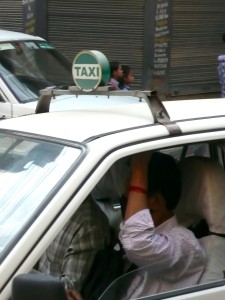
Typical white Kathmandu taxi. These are 20+ year old Toyota or Suzuki brand vehicles. Sitting in the back seat over rusted floor boards…you may have to extract a spring from your derrière.
“Since the college had provided partial scholarship, we had to have some money to pay for the school expenses. However, I could not get any support from the people I asked for help. Then I went to one of my cousin’s husband and asked if he could help. He was working in Nepal Army and his designation was Major. He had just arrived from the peace keeping mission of UN in Lebanon. He told that he had brought two VCRs and I could sell one and use the money. It was a time in Nepal that TV and VCR were very expensive and were new. I took the VCR and sold it in the market at around $900 (USD). Then another friends, whom I had helped in the past and was working with a British Project, provided about $500 (USD). One of my student at high school, who was running a shop in Kathmandu provided about $200 (USD). The money were received just about a week before our departure date to the US. Thus I got the money in Nepalese Rupee.
“However, the big problem was to exchange the money in dollar. We had to get approval from the Ministry of Education to get permission for exchange. Dhananjay and I went to the Ministry of Education, filled up the request form and submitted five day before our departure date. The process was so slow that we did not have permission to exchange dollar just a day prior to the departure date…We had not paid for the air ticket also because they required the payment in dollar. The Education Ministry people gave the dollar exchange permission letter just before 4 pm and our airport reporting time was 11 AM the following day. The bank was closed by then. We showed the dollar exchange permission letter to the airline and they issued the ticket around 5 PM. The only baank that could issue dollar that time was Nepal Rashtra Bank of the government.
“The following morning, we went straight to the bank at 10 AM with our baggage and the bank was not even opened. Around 10:20 the manager showed up. We requested to the manager in the bank to help us get the dollar as soon as possible and we showed him our air ticket. Still it took some time to do the processing and we got dollar at 11 AM. We took a taxi and headed straight to the airport and arrived there at 11:30 AM, which was not too late. After we checked in we took a deep breath of relieve. Thus we left Nepal for the long trip to the US.”
Have you ever had a a frantic rush to meet a deadline? Did you ever ask yourself if circumstances were truly out of your control? or do you secretly enjoy the drama and suspense? Join me next week as I take a break in the story and give you a pictorial armchair experience of Kathmandu.
Chapter 4 – January 1989
Mahabir Pun and his friend Dhanajaya arrived in Kearney, Nebraska in January 1989…anticipated but unannounced. Dr. Skov described the event: “I do remember that they had not mailed any letters about their trip to Kearney. Literally, I did not know if/when they would even be coming, they “just walked in”.”
It was the winter break and the campus was shut down until the return of students for spring semester. Dr. Skov recalled: “So, we needed to get them housed, etc. “on the fly”. With them sitting in my office…we had arranged housing, food arrangements, and the other necessities. I remember when I had first proposed to bring Mahabir and Dhanajaya to Kearney…with him (Dean Nestor)…I explained their possible coming, and he said “OK” and “do whatever to make it work”. So we did…but, in about 1 hour, we had housing arrangements, food service, jobs in the food service system, and through the help of lots of necessary staff, we were ready to go.”
Mahabir’s style of throw mud on the wall was evident early on during his education and in part is culturally mediated. In Nepal if you are traveling and need a place to sleep and eat…you have only to knock on the nearest door and you will be welcomed and taken care of. He knew where he was going and what he had to do to get there…he trusted everything else would sort itself out. There is something refreshing about his passion of embracing the possible. So many times I find my own disappointments weighed down not by an actual outcome but by a failed expectation. In other words…what happens in the end is not the disappointment…it was the expectation that set an unrealistic course.
Have you ever faced an event in your life with conviction and passion leading the way. Share your story with my readers. Join me next week for more about Mahabir Pun’s days in Kearney.

